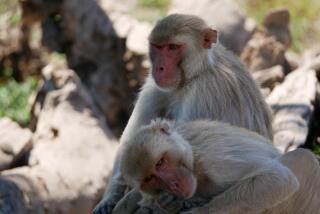Primates as Peacemakers
- Share via
Among primates, making peace is as natural as making war, according to a primatologist from the University of Wisconsin at Madison. This behavior indicates that mechanisms to alleviate tension in human relationships evolved together with aggression, said Frans B. M. de Waal.
“Most animal behavior is explained in terms of a struggle for existence and animals are depicted as very competitive and very selfish,” de Waal said. “My research indicates that primates value relationships and put energy into maintaining them.”
Chimpanzees--the closest relative of humans--make peace with adversaries most frequently and most emotionally, he said. An attacker will stretch out his or her hand to a victim within 10 to 15 minutes after a quarrel. The chimps will typically then embrace or kiss on the mouth.
Rhesus monkeys typically smack their lips and pick through each other’s hair as a gesture of reconciliation. Stump-tail monkeys, in addition to grooming and lip-smacking, also chatter their teeth and hold on to each other’s stumps. Pygmy chimpanzees engage in sexual behaviors ranging from genital touching to mating.
De Waal said that his studies support the idea that children can be taught nonviolent behaviors to resolve aggression.
“There is a lot of flexibility in our species,” he said. “We can teach almost anything we want to our children.”
More to Read
Sign up for Essential California
The most important California stories and recommendations in your inbox every morning.
You may occasionally receive promotional content from the Los Angeles Times.











